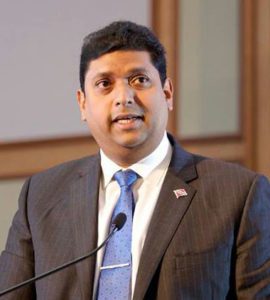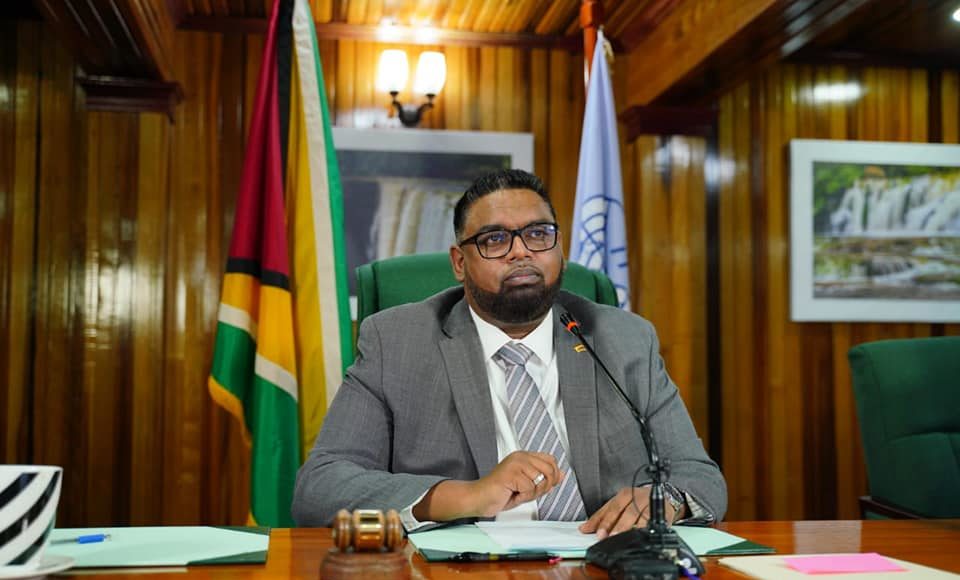This week marks one year since a new government was sworn into office in Guyana following a 5-month ordeal that threatened the South American country’s fragile democracy. The Guyana Elections Commission (GECOM) declared the opposition People’s Progressive Party Civic (PPP/C) the winner of the elections and its candidate, Dr. Mohamed Irfaan Ali, the elected President of the new oil producing country on August 2, 2020, following elections that were held on March 2.
Declarations were initially made for the Region 4 district that were inconsistent with the votes cast and then an effort to embark on a recount process was delayed. Even after the recount was completed and the results showed the incumbent A Partnership for National Unity + Alliance For Change (APNU+AFC) had lost the elections, GECOM’s Chief Elections Officer attempted to submit results to the Commission that would’ve given more votes to the Granger-led coalition. National, regional and international condemnation and pressure, including sanctions by the United States on officials believed to have been complicit in an attempt to rig the election, finally resulted in GECOM declaring results that were consistent with what the recount reflected. A number of officials have since been charged and are now before the court for wrongdoing.
One year later, how has the new PPP/C led administration done in its stewardship of the oil and gas sector? OilNOW caught up with analysts, a key private sector representative and the minister responsible for the oil and gas sector for their take on the government’s performance.

Schreiner Parker, Rystad Energy’s Vice President for Latin America and the Caribbean, said Guyana is proving to be the exception rather than the rule when it comes to a nation that’s first entering the oil and gas industry. He said a look at countries that have found oil would show there has been a mixture of negative effects that have complicated rather than benefited the country in which the resources were found.
“I think Guyana, although it has had a few moments of questioning whether or not we’re going to see this again or not, has managed to execute a democratic transition of power in a setting where you had a lot of money at stake,” Parker said. He pointed out that ExxonMobil, as operator of the Stabroek Block, “has taken a really progressive view” after being a corporate citizen of Guyana. “A very 21st century view, rather than the view that was taken by other companies and other places.” He pointed out that the third aspect is that the country has a world-class basin that is relatively untouched and will end up being “one of the most prolific basins in the Western hemisphere” in the years to come.

Former Trinidad and Tobago energy minister, Kevin Ramnarine said one of the achievements of the Ali administration was the stabilization of Guyana “considering the traumatic events” that followed the March 2020 election. He said a testament to that is the surge in investor confidence over the last year.
“The President and his Government have also articulated a clear vision for the development of the country. With regard to the oil industry, the Ali administration has rightfully prioritized local content policy and natural gas to electricity,” Ramnarine stated. “These are steps in the right direction. In the last year, the progress made in the oil industry compares favorably when you consider the challenges of other emerging oil provinces.” He said there is a lot of work ahead, but he is confident that the country is moving in the right direction.

Timothy Tucker, President of the Georgetown Chamber of Commerce and Industry (GCCI) said the first year of the new government has been encouraging for the private sector. “The government has provided credible signals that they are serious about private sector development which has provided confidence and stability,” he pointed out.
Tucker said from day one, the government set out on a development agenda to work with the private sector to facilitate growth across all sectors. “This is especially true for the oil and gas sector. They have sped up approvals that were languishing,” he stated. “They have also started work on a single window for building permits, investments, Guyana Revenue Authority and establishing enterprises.”
The leader of the Chamber said the new administration has also moved aggressively towards the realization of the gas to shore project which will create an upstream industry. “It will also facilitate low-cost electricity and boost manufacturing.”
However, Tucker was clear to point out that not all areas have seen the level of progress needed if the oil and gas sector is to truly benefit Guyanese. “Even though I acknowledge all the successes, I am also greatly disappointed that after 6 years into oil and gas discovery that we cannot have a local content policy realized nor a single step towards local content legislation.”
He said too that with all the issues surrounding the Production Sharing Agreement between Guyana and Exxon, Hess and CNOOC, the only way Guyanese can benefit now and in the future is with a strong local content policy or legislation and a fully functioning Sovereign Wealth Fund.
“Guyanese have suffered long enough and have shown enough faith and belief in this nation not to be given the prosperity it deserves,” Tucker stated.

Meanwhile, natural resources minister, Vickram Bharrat, said government has been working to ensure benefits from the oil and gas sector are enjoyed by all Guyanese, and that the administration is placing strong emphasis on transparency and accountability.
“The sector is being managed by a competent team at the Ministry of Natural Resources led by the Vice President and Minister of Natural Resources,” he told OilNOW.
Bharrat said substantial work has been done on the local content policy with realistic targets and time frame. The Government of Guyana is working to build capacity locally, suppliers, businesses and human resources.”
He said too the administration has established a good working relationship with the operators and hold weekly meetings with the technical teams to collaborate and develop the oil and gas sector.
“Exploration activities are ongoing in other blocks besides the Stabroek block and there have been five major discoveries over the last year,” he pointed out, adding that, “Production will exceed 500,000 barrels of oil per day by mid-2024 and significant works are ongoing with the Gas to Energy project.”
Meanwhile on Monday, President Ali vowed to ensure that Guyana does not become dependent on its vast hydrocarbon resources but would instead use it to accelerate growth in other sectors of the economy.
“Our economy will never be based on oil and gas. Oil and gas gives us the impetus to accelerate other aspects of the economy. It gives us the advantage of fast-tracking other initiatives that will make other segments of the Guyanese economy competitive,” Ali said.




